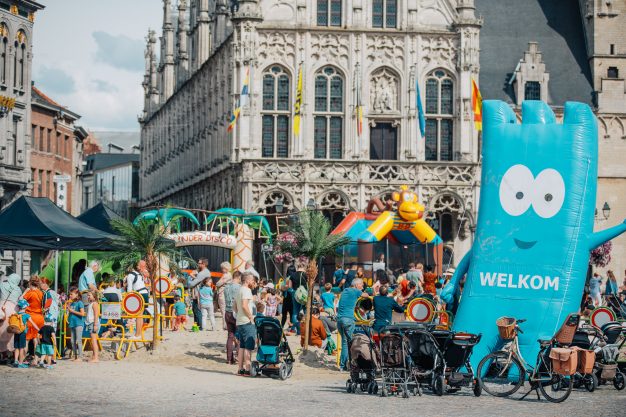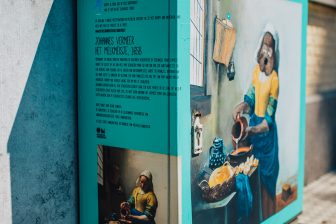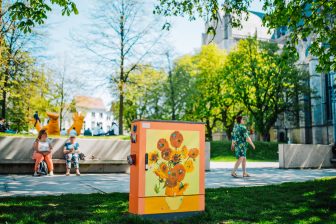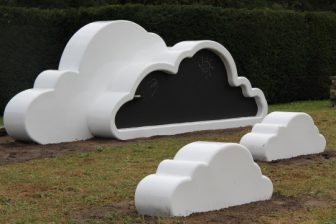
Mechelen – the evolution of a child-friendly city
As child-friendly municipalities go, the ancient city of Mechelen in northern Belgium is a shining example. From families to play to culture, from leisure to sports to the arts, it ticks many boxes. But getting here has involved a great deal of hard work. Karen Claes, from the City of Mechelen, will speak at next month’s Child in the City World Conference about the challenges faced in making Mechelen’s ‘everyday environment’ all about the child. She spoke to CitC ahead of the conference.
CiTC: In your opinion, what constitutes a truly ‘child-friendly’ city?
KC: “In a child-friendly city it is necessary to give every child the right to be a child and let them feel welcome in a family-customised city.”
What makes Mechelen stand out from the rest?
“It’s our mission to make the everyday environment of ALL children a priority and work across our organisation with an intersectional child-friendly approach to all services and in our policy areas. This covers areas such as safe traffic, more green spaces and parks, child participation, clean spaces, play, child-friendly restaurants, and much more. We also work with external partners.
“In recent years we have made our city-wide approach more in line with our social department that has a focus towards children’s rights. Working closely with colleagues in the marketing and communication department, we bring everything together to promote Mechelen as a child-friendly city.”

Are there any unique challenges – for example, poverty, ethnic communities or cultural issues – which Mechelen has had to address?
“Yes, fighting against children’s poverty is a priority for our local government. We work hard to secure all the children’s rights by working and investing on different paths, to guarantee a healthy environment.”
What practical support can you provide to families?
“We don’t isolate children in vulnerable situations but go for a help approach that involves the whole family. In our social department we have the family justice center which provides domestic violence help from one central location). There is our GO team, which offers family support and welfare assistance, and the PACE project, providing daycare in combination with employment for the parents.
“We innovate on affordable rental properties, helping vulnerable families with registering for education, creating an inviting public domain and participation in different stages, and support with homework. We also offer a lot of free leisure activities.”
Can you highlight any particularly good examples of children and/or families who have benefited from the work in Mechelen?
“Yes, for instance, it’s important to make difficult themes, such as death, easier to talk about. We created a dedicated space in our local graveyard where people, especially families can grieve. It’s a place where parents and children can talk and draw with chalk on a big cloud statue.
“Every year we organise a Playday, where the whole city centre transforms into a play garden with toys, and where our child-friendly partner organisations and providers give fun presentations, this gives children the chance to play and discover some new activities.
“We also have nappy-changing points, where parents can drop the rest of unused nappies. We make nappy parcels and sell them very cheap to vulnerable families.
“And we also made an art route (‘kunstroute’) by decorating the exterior of the city’s electricity supply cabinets, and on this route children can view and experience some iconic artworks which have an animal twist and learn. It’s fun for the whole family and very accommodating.”

In 2017, Bart Somers, the Mayor of Mechelen, was awarded the World Mayor Prize. What tangible effect has this had on the city in terms of its child and family-friendly policies?
“Our Mayor supports our child-friendly vision that Mechelen is a city where every child can be a child with their own rights and chances. Mechelen strives to be a city where children can develop in a safe, friendly and dynamic environment, together with their families.
“The city of Mechelen has a very hands-on approach when it comes to child poverty and difficult family situations. Through an individual approach we try to tackle the specific challenges and we aim to offer families and children customized solutions for their problems. With this policy, we are an example for other organisations that focus on poverty and delicate family situations.”
What are the most important questions that policymakers should be asking regarding children and families before mapping out the future of the cities they run?
“What kind of future do we want for our children? How can we make our cities ‘childproof’ and give them enough chances in terms of education, safe living, developing talents, healthy food and play? How can we guarantee this and what do we need to realise that? It’s important to hear the voice of the children.
“We have a children’s council with different ethnic backgrounds, and together we develop their ideas. We also work on accessibility and diversity so everyone can easily participate in our city. We always have to think a step ahead and work together with our target group, the children. We cannot forget what the young people want – it’s they who we are working for.”
How does a city authority work with other stakeholders to set out a blueprint for ensuring child-friendly cities deliver the economic, cultural, health and social benefits to society?
“It’s important to have a vision so that stakeholders have a foundation to work with. Any blueprint should include:
- Creating a network of people and organisations in your city that are open-minded towards child-friendly ideas and opportunities
- Sharing ideas – we exchange ideas within our national network of other child-friendly cities. Together with these cities we develop a good definition of what is ‘child-friendly’ and how to make this work. Mechelen has received an official national child-friendly label for its approach.
- Take your time to create concepts in a qualitative way. A blueprint isn’t something that lies on the table after a month. As a city we develop and grow and you have to be bold, in different ways.”

What is the main way in which events like Child in the City World Conference 2018 can help make a real and measurable difference to future planning?
“It’s nice to hear other stories and ideas worldwide. Sometimes it works, and that is what inspires you, but equally you can also learn from failures.”
If there was one key message that you would like delegates to take away from your presentation, what would it be?
“I hope I can inspire some people with my story: it’s important to have a worldwide network that shares the same goals and can share experience. We have to work together and, as a child-friendly city, give every child the right and environment for a beautiful future. Come to Mechelen to enjoy our city and see our approach in real life!”
For more information about Mechelen and its child-friendly activities, visit: https://visit.mechelen.be/families (English) and www.mechelenkinderstad.be (Nederlands)
Karen Claes will be speaking at the 9th Child in the City World Conference in Vienna from September 24-26. Her presentation is scheduled for Tuesday 25 September as part of the parallel session, Child Friendly – from local to national. Register for the conference here.




